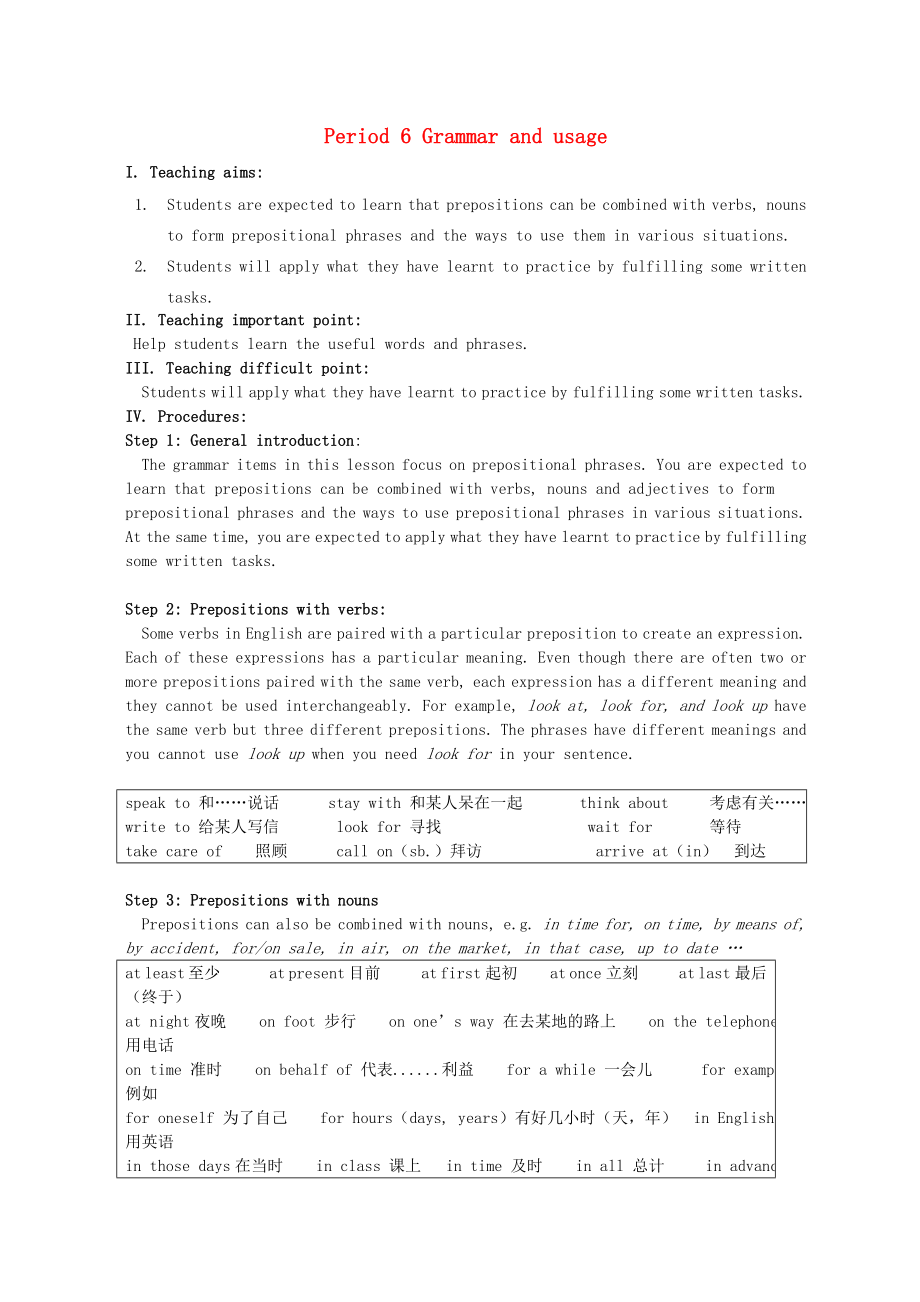《高中英語 Unit1 Living with technology Period 6 Grammar and usage教案 牛津譯林版選修》由會員分享����,可在線閱讀,更多相關(guān)《高中英語 Unit1 Living with technology Period 6 Grammar and usage教案 牛津譯林版選修(3頁珍藏版)》請在裝配圖網(wǎng)上搜索��。
1、Period 6 Grammar and usage
I. Teaching aims:
1. Students are expected to learn that prepositions can be combined with verbs, nouns to form prepositional phrases and the ways to use them in various situations.
2. Students will apply what they have learnt to
2�、practice by fulfilling some written tasks.
II. Teaching important point:
Help students learn the useful words and phrases.
III. Teaching difficult point:
Students will apply what they have learnt to practice by fulfilling some written tasks.
IV. Procedures:
Step 1: General introduction:
Th
3、e grammar items in this lesson focus on prepositional phrases. You are expected to learn that prepositions can be combined with verbs, nouns and adjectives to form prepositional phrases and the ways to use prepositional phrases in various situations. At the same time, you are expected to apply what
4���、they have learnt to practice by fulfilling some written tasks.
Step 2: Prepositions with verbs:
Some verbs in English are paired with a particular preposition to create an expression. Each of these expressions has a particular meaning. Even though there are often two or more prepositions paired
5、with the same verb, each expression has a different meaning and they cannot be used interchangeably. For example, look at, look for, and look up have the same verb but three different prepositions. The phrases have different meanings and you cannot use look up when you need look for in your sentence
6����、.
speak to 和……說話 stay with 和某人呆在一起 think about 考慮有關(guān)……
write to 給某人寫信 look for 尋找 wait for 等待
take care of 照顧 call on(sb.)拜訪 arrive at(in) 到達
Step 3: Prepositions with nouns
Prepositions can also be combined with nouns, e.g. i
7、n time for, on time, by means of, by accident, for/on sale, in air, on the market, in that case, up to date …
at least 至少 at present 目前 at first起初 at once立刻 at last最后(終于)
at night夜晚 on foot 步行 on one’s way 在去某地的路上 on the telephone 用電話
on time 準(zhǔn)時 on behalf of 代表......利益
8����、 for a while 一會兒 for example 例如
for oneself 為了自己 for hours(days, years)有好幾小時(天,年) in English 用英語
in those days在當(dāng)時 in class 課上 in time 及時 in all 總計 in advance 事前
in the meantime 與此同時 in place 適當(dāng)?shù)? in hopes of(或in the hope of) 懷著.......希望
in connection with 和……有關(guān)
9����、 in contact with 和……聯(lián)系 in addition to 除......以外
in case of 倘若,萬一 in conflict with 和......沖突 in force 有效的���,大批
in depth 徹底地 in regard to 關(guān)于 in the neighborhood of 大約���、鄰近
in retrospect 回顧,一想起 in the least 一點����,絲毫 in alarm 驚慌����、擔(dān)心
in the opinio
10���、n of 據(jù)……見解 in the long run/term 從長遠(yuǎn)說來 in one's opinion 在……看來
in word 口頭上 in a word 總之 in vain 無益地, 白白地 in case 如果��,萬一���,以防
in detail 詳細(xì)地 in haste 急急忙忙地 in conclusion 總之 in spite of 盡管
in honour/memory of 為紀(jì)念 in charge of 負(fù)責(zé) in praise of 贊揚
in other words.
11、.. 換句話說 in return 作為回報 in the name of 以......名義
in doubt 懷疑 in debt 負(fù)債 by the way 順便說???????? by oneself 獨自地
after school 放學(xué)后 of course 當(dāng)然 at work 在工作 at school在上學(xué)
at war 在交戰(zhàn)
Step 4: Prepositions with adjectives
be absent from 缺席 be proud of 以……為自豪 be
12���、 different from 和……不同
be famous for 因……而著名 be fond of…… 愛好�,喜歡 be pleased with 樂于
be sorry for(sth.)為……抱歉 be afraid of 害怕…… be kind to 對某人親切
be good at 在……做得好�;擅長于…… be late for遲到 be confident in 對 ……有信心
be interested in對 ……感性趣
Some prepositions can also be combined with adjectives,
13、 e. g. good at, capable of, fond of, full of, happy with …
Step 5. Excises:
Now, please complete the introduction to the digital camera on page 9. Check the answers as a whole class.
Answers
(1) on sale (2) up to date (3) capable of (4) stands for (5) satisfied with
(6) on th
14���、e market (7) In that case (8) in time for (9) up to (10) agree with
Step 6. Extensions:
1. The functions of prepositional phrases
● as an adverbial
My mother has worked in the school for nearly twenty years.
To our great surprise, all of the students have passed the exam.
M
15��、y father goes to work on foot, but if it rain, he will go by bus.
● as an attribute
The girl under the tree is my good friend.
The book with a red cover was given to me as a birthday present.
Please pass me the one on the left.
● as an object complement
Later, I found my watch in my po
16���、cket.
I left my book in the classroom.
Before it is ready to eat, we’d better keep it in the fridge for a while.
2. When a preposition is used after an intransitive verb to form a prepositional verb, the prepositional verb can be followed by an object. For example :
Who will look after the children when Mother is away?
You can always believe in him. He won’t let you down.
Let’s look over the notes before the test.
Step7.Homework:
Ask students to finish exercises of part C2 on page 104 of Workbook.
V. Design of writing on blackboard:
VI. Record after teaching:
 高中英語 Unit1 Living with technology Period 6 Grammar and usage教案 牛津譯林版選修
高中英語 Unit1 Living with technology Period 6 Grammar and usage教案 牛津譯林版選修

